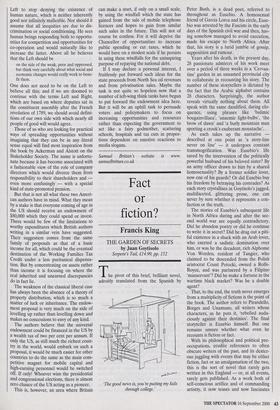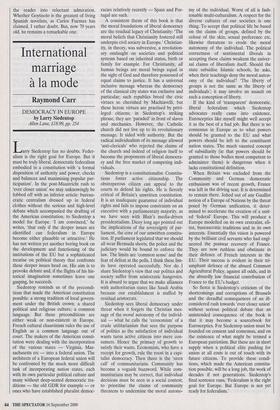Fact or fiction?
Francis King
THE GARDEN OF SECRETS by Juan Goytisolo Serpent's Tail, £14.99, pp. 152 The pivot of this brief, brilliant novel, adroitly translated from the Spanish by The good news is, you're putting my kids through college.' Peter Bush, is a dead poet, referred to throughout as Eusebio. A homosexual friend of Garcia Lorca and his circle, Euse- bio was arrested by the Fascists in the early days of the Spanish civil war and then, hav- ing somehow managed to avoid execution, made his escape to North Africa. After that, his story is a lurid jumble of gossip, supposition and rumour.
Years after his death, in the present day, 28 passionate admirers of his work meet over a period of three weeks in a `Cervan- tine' garden in an unnamed provincial city to collaborate in recounting his story. The number of these storytellers is dictated by the fact that the Arabic alphabet contains 28 characters. Surprisingly, the author reveals virtually nothing about them. All speak with the same dandified, daring elo- quence, using phrases like 'bulimic bougainvillaea', 'anaemic light-bulbs', 'the brow of dawn' and 'a burly mountain man sporting a crook's exuberant moustache'.
As each takes up the narrative described at one point as 'a story-line never on line' — it undergoes constant transmogrification. Was Eusebio's life saved by the intervention of the politically powerful husband of his beloved sister? By an army officer drawn to him by a shared homosexuality? By a former soldier lover, now one of his guards? Or did Eusebio buy his freedom by betraying his comrades? As each story crystallises in Goytisolo's jagged, multifaceted, glittering prose, one can never by sure whether it represents a con- fection or the truth.
The stories of Eusebio's subsequent life in North Africa during and after the sec- ond world war are equally contradictory. Did he abandon poetry or did he continue to write it in secret? Did he drag out a piti- ful existence in a shack with an Arab lover, who exerted a sadistic domination over him, or was he the decadent, rich Alphonse Von Worden, resident of Tangier, who claimed to be descended from the Polish aristocrat Count Potocki, owned a Rolls- Royce, and was partnered by a Filipino `manservant'? Did he make a fortune in the wartime black market? Was he a double agent?
. That, to the end, the truth never emerges from a multiplicity of fictions is the point of the book. The author refers to Pirandello, Borges and Unamuno, all writers whose characters, as he puts it, 'rebelled auda- ciously against their destinies'. The final storyteller is Eusebio himself. But one remains unsure whether what even he recounts is fiction or fact.
With its philosophical and political pre- occupations, erudite references to often obscure writers of the past, and its dexter- ous juggling with events that may be either fiction, fact or an amalgamation of the two, this is the sort of novel that rarely gets written in this England — or, at all events, rarely gets published. As a work both of self-conscious artifice and of commanding artistry, it now teases and now fascinates the reader into reluctant admiration. Whether Goytisolo is the greatest of living Spanish novelists, as Carlos Fuentes has claimed, I rather doubt. But, now 70 years old, he remains a remarkable one.



































































 Previous page
Previous page